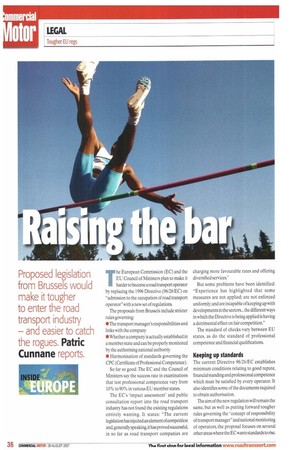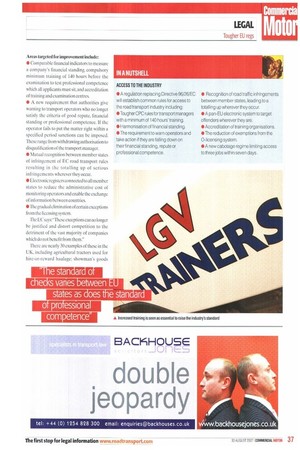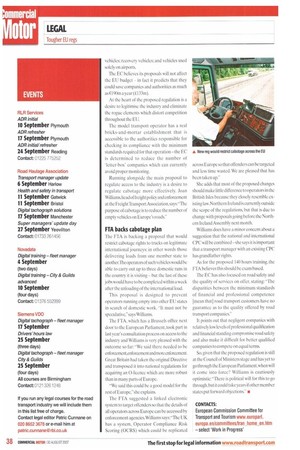Proposed legislation from Brussels would make it tougher to enter the road
Page 36

Page 37

Page 38

If you've noticed an error in this article please click here to report it so we can fix it.
transport industry — and easier to catch the rogues. Patric Cunnane reports. The European Commission (EC) and the EU Council of Ministers plan to make it harder to become a road transport operator by replacing the 1996 Directive (96/26/EC) on -admission to the occupation of road transport operator" with a new set of regulations.
The proposals from Brussels include stricter rules governing: • The transport manager's responsibilities and links with the company • Whether a company is actually established in a member state and can be properly monitored by the authorising national authority • Harmonisation of standards governing the CPC (Certificate of Professional Competence).
So far so good. The EC and the Council of Ministers say the success rate in examinations that test professional competence vary from 10% to 90% in various EU member states.
The EC's 'impact assessment' and public consultation report into the road transport industry has not found the existing regulations entirely wanting. It states: "The current legislation has injected an element of competition and, generally speaking, it has proved successful, in so far as road transport companies are charging more favourable rates and offering diversified services."
But some problems have been identified: "Experience has highlighted that some measures are not applied; are not enforced uniformly; and are incapable of keeping up with developments in the sectors... the different ways in which the Directive is being applied is having a detrimental effect on fair competition."
The standard of checks vary between EU states, as do the standard of professional competence and financial qualifications.
Keeping up standards The current Directive 96/26/EC establishes minimum conditions relating to good repute, financial standing and professional competence which must be satisfied by every operator. It also identifies some of the documents required to obtain authorisation.
The aim of the new regulation will remain the same, but as well as putting forward tougher rules governing the "concept of responsibility of transport manager" and national monitoring of operators, the proposal focuses on several other areas where the EC wants standards to rise. Areas targeted for improvement include: • Comparable financial indicators to measure a company's financial standing, compulsory minimum training of 140 hours before the examination to test professional competence which all applicants must sit, and accreditation of training and examination centres • A new requirement that authorities give warning to transport operators who no longer satisfy the criteria of good repute, financial standing or professional competence. If the operator fails to put the matter right within a specified period sanctions can be imposed. These range from withdrawing authorisation to disqualification of the transport manager.
• Mutual recognition between member states of infringement of EC road transport rules resulting in the totalling up of serious infringements wherever they occur.
• Electronic registers connected to all member states to reduce the administrative cost of monitoring operators and enable the exchange of information between countries.
• The gradual elimination of certain exceptions from the licensing system.
The EC says:"Thesc exceptions can no longer be justified and distort competition to the detriment of the vast majority of companies which do not benefit from them."
There are nearly 30 examples of these in the UK, including agricultural tractors used for hire-or-reward haulage: showman's goods vehicles; recovery vehicles; and vehicles used solely on airports.
The EC believes its proposals will not affect the EU budget — in fact it predicts that they could save companies and authorities as much as €190m a year (f133m).
At the heart of the proposed regulation is a desire to legitimise the industry and eliminate the rogue elements which distort competition throughout the EU.
The model transport operator has a real bricks-and-mortar establishment that is accessible to the authorities responsible for checking its compliance with the minimum standards required for that operation—the EC is determined to reduce the number of 'letter-box' companies which can currently avoid proper monitoring.
Running alongside the main proposal to regulate access to the industry is a desire to regulate cabotage more effectively. Joan Williams. head of freight policy and enforcement at the FreightTransport Association,says:"The purpose of cabotage is to reduce the number of empty vehicles on Europe's roads."
FTA backs cabotage plan
The FTA is backing a proposal that would restrict cabotage rights to trucks on legitimate international journeys: in other words those delivering loads from one member state to another.The operators of such vehicles would be able to carry out up to three domestic runs in the country it is visiting — but the last of these jobs would have to be completed within a week after the unloading of the international load.
This proposal is designed to prevent operators running empty into other EU states in search of domestic work. It must not be speculative," says Williams, The FTA, which has a Brussels office next door to the European Parliament, took part in last year's consultation process on access to the industry and Williams is very pleased with the outcome so far: We said there needed to be enforcement,enforcement and more enforcement. Great Britain had taken the original Directive and transposed it into national regulations for acquiring an 0-licence which are more robust than in many parts of Europe.
"We said this could be a good model for the rest of Europe," she explains.
The FTA suggested a linked electronic system to target offenders so that the details of all operators across Europe can be accessed by enforcement agencies. Williams says: -The UK has a system, Operator Compliance Risk Scoring (OCRS) which could he replicated across Europe so that offenders can be targeted and less time wasted. We are pleased that has been taken up.
She adds that most of the proposed changes should make little difference to operators in the British Isles because they closely resemble existing law. Northern Ireland is currently outside the scope of the regulations, hut that is due to change with proposals going before the Northern Ireland Assembly next month.
Williams does have a minor concern about a suggestion that the national and international CPC will be combined—she says it is important that a transport manager with an existing CPC has grandfather rights.
As for the proposed 140 hours training, the FTA believes this should be exam based.
The EC has also focused on road safety and the quality of services on offer, stating: The disparities between the minimum standards of financial and professional competence [mean that] road transport customers have no guarantee as to the quality offered by road transport companies."
It points out that negligent companies with relatively low levels of professional qualification and financial standing compromise road safety and also make it difficult for better qualified companies to compete on equal terms.
So, given that the proposed regulation is still at the Council of Ministers stage and has yet to go through the European Parliament,when will it come into force? Williams is cautiously optimistic: "" [here is political will for this to go through, but it could take years if other member states put forward objections."
CONTACTS: European Commission Committee for Transport and Tourism www.europarl. eurapa.en/committeestlran home_en.htm —select 'Work in Progress'






















































































































































































